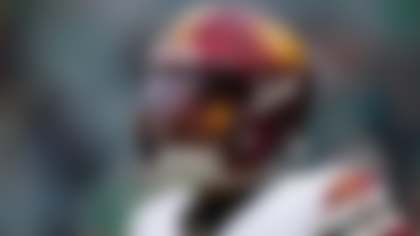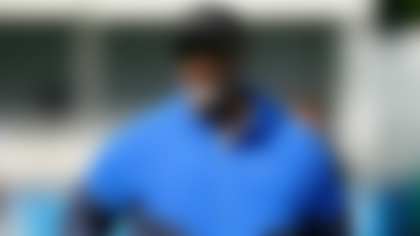SEATTLE -- What took place Saturday once was unimaginable, and now the Seattle Seahawks hope it's not out of the question they can do something else which once seemed unthinkable, too.
The Seahawks beat the Washington Redskins, 35-14, in a first-round playoff game because of their, drum roll, please, defense. Next they will find out if their defense, the team's best in a decade, will be good enough to survive a divisional playoff game at Green Bay.
"You gotta take your hat off to the organization," said offensive tackle Walter Jones, Seattle's longest-tenured player, in his 11th season with the team. "They got (defensive) guys who can go out and make plays. The defense is built on speed and getting to the quarterback, and these guys can do it with the best of them.
"A defense that good can put you in position to score points."
Or score points itself.
Against Washington, the Seahawks played lethargically for much of the game on offense, but they produced a fourth-quarter, go-ahead touchdown drive after the Redskins' Scott Suisham missed a 30-yard field goal attempt, and then Marcus Trufant and Jordan Babineaux returned interceptions for touchdown to make the final score more lopsided than the game actually was.
Seattle has tried for years to improve its defense. Eight of their 11 defensive starters came to the team since 2005, and the additions this year of defensive end Patrick Kerney and safeties Brian Russell and Deon Grant finally lifted the Seahawks into the ranks of the league's better defensive teams.
The Redskins were unable to block Kerney, who led the NFC in sacks, with one lineman. By double-teaming and, at least once, even triple-teaming him, the Redskins left the quick Seattle linebackers free to chase down plays. Washington, trying to protect quarterback Todd Collins, wanted to control the game with Clinton Portis' running, but he was limited to 52 yards on 20 carries, an average of 2.6, and was often caught from behind by a linebacker.
Seahawks linebackers Leroy Hill, Lofa Tatupu and Julian Peterson were the game's leading tacklers, credited with 23 tackles, 12 assists, two sacks, five quarterback hits and one pass defensed among them.
"We proved we can play defense," Hill said. "A lot of people consider the Seahawks an offensive team, and we're just trying to prove we can play a little defense, too."
"We're not the biggest or the most physical team," Peterson added, but he pointed out the Seahawks' defense has the quickness to run with most teams. The only success the Redskins had with their running game came when they spread the Seattle defense out by using three or four receivers, but that exposed Collins to frequent hits.
Peterson opined that the Seahawks will need to tighten up their third-down defense against Green Bay, but it really wasn't too bad. Washington converted only 4 of 18 third downs into first downs.
For the Redskins, the defeat ended an emotional season that turned following the tragic death of safety Sean Taylor. After starting 5-7, Washington won its final four games behind Collins, who hadn't started a game in 10 years, to earn the NFC's final wild-card spot. In five games, Collins didn't throw an interception until the two late ones that were returned for TDs.
"People see us going home, it's the first round, and we're out already," Portis said. "But as an organization and as a team, we grew together. It's unbelievable. I think you'll find a lot of guys in the off-season hanging out in camp with one another."
Only Washington's defense managed to keep them in the game. The Redskins led, 14-13, in the fourth quarter, when a crazily-bouncing kickoff by Suisham eluded the Seahawks' Nate Burleson, and the Redskins recovered the ball at Seattle's 14-yard line.
But Kerney broke up a first down pass, helped stop Portis for two yards on second down, and harassed Collins into an incompletion on third down before Suisham missed the chip shot kick. Thus did momentum and the game swing to Seattle.
"That miss really fed us a great deal of energy, a great deal of emotion," Kerney said. "From that point on, we responded well and really took control of the game."
Seattle coach Mike Holmgren is known for his offense because he's a graduate of the Bill Walsh West Coast offense coaching school. But at the same time, Holmgren understands that having this good of a defense "means everything."
This season was the first in six years that the Seahawks ranked higher in the league in points allowed than they did in points scored.
"A lot of teams look at it differently," Holmgren said. "If they have a good defense, they play it (conservatively) and try to win, 14-13. I think, if you have a great defense, it frees you up to be as open as you want as a play-caller, because the defense bails you out of stuff."
In the Seahawks' case, that "stuff" included Matt Hasselbeck's two second-half interceptions, one of which led to the touchdown that briefly gave Washington the lead.
Washington had 17 possessions in the game, a huge number by normal NFL standards. But the Redskins didn't cross the 50 until their sixth possession, when they started at Seattle's 44 following a short punt, before a sack by Hill pushed them back across the 50 -- in the wrong direction. On 13 of their 17 possessions, the Redskins made no more than one first down.
The playoff game at Green Bay will be a trip down memory lane for Holmgren, who coached the Packers to their last two Super Bowl trips in the '90s, and also for Hasselbeck, who was drafted by Green Bay and had an unfortunate experience there four years ago in the Seahawks' last playoff trip to Wisconsin.
In that game, following the 2003 season, Hasselbeck threw an overtime interception that was returned for a touchdown -- right after the Seahawks won the coin toss and Hasselbeck announced at midfield, for all to hear, "We want the ball, and we're going to score."
At the time, Hasselbeck didn't realize the referee's microphone was on and that his words would be broadcast nationally and live forever.
Now, however, he's able to laugh about it.
He walked into a postgame interview room after beating Washington and the first thing he said was, "I just want to say right now that we want the ball and we're going to score." After the laughter died down, he said, "Is that okay? I said it, I mean it. Thank you."
It will not be easy.
But perhaps he should talk to Kerney, who played on an Atlanta team that won a playoff game at Green Bay following the 2002 season -- the Packers' first-ever postseason defeat in Wisconsin. Seattle has not won a road playoff game in more than 20 years.
"You know that you can win on the road in a hostile environment," Kerney said, invoking the memory of that five-year-old game. "That was a great win for us in Lambeau. It was snowing ... it's what you play football for. It's going to be a high-energy environment next week. I'm sure it will be nice and cold, and it's that gritty, late-season football that you love."
And even with two of the dwindling number of West Coast offense teams facing off, chances are the game will be decided by which team plays better defense. By coincidence, Seattle and Green Bay tied for sixth in the league in fewest points allowed during the 2007 season. Consider next Saturday's game to be the tie-breaker.
Veteran NFL writer Ira Miller is a regular contributor to NFL.com.



